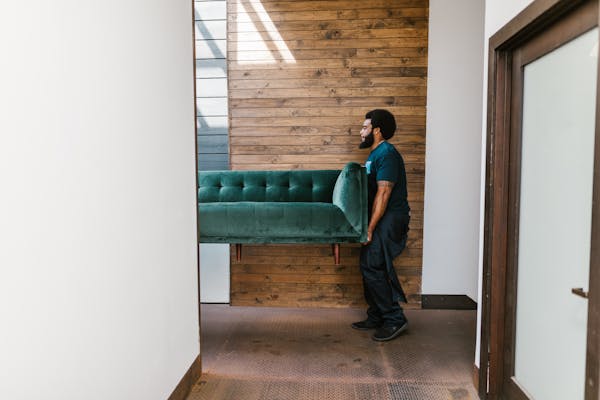Every time Benjamin Kaila, a database administrator who immigrated from India to the United States in 1999, applies for a task at a U.S. tech corporation, he prays that there are no other Indians all through the in-human being interview. Which is because Kaila is a Dalit, or member of the most affordable-ranked castes within just India’s method of social hierarchy, formerly referred to as “untouchables.”
Silicon Valley’s variety troubles are well documented: It’s nevertheless dominated by White and Asian adult males, and Black and Latino workers stay underrepresented. But for decades, as debates about meritocracy raged on, the tech industry’s reliance on Indian engineers permitted yet another variety of discrimination to fester. And Dalit engineers like Kaila say U.S. companies aren’t equipped to deal with it.
In much more than 100 job interviews for contract perform more than the previous 20 years, Kaila claimed he bought only just one task present when one more Indian interviewed him in man or woman. When associates of the job interview panel have been Indian, Kaila states, he has confronted personal inquiries that seem to be to be utilised to suss out regardless of whether he’s a member of an upper caste, like most of the Indians working in the tech business.
“They really do not convey up caste, but they can quickly identify us,” Kaila states, rattling off all of the ways he can be outed as possibly currently being Dalit, which includes the point that he has darker skin.
The legacy of discrimination from the Indian caste technique is almost never discussed as a variable in Silicon Valley’s persistent variety difficulties. A long time of tech sector labor tactics, these as recruiting candidates from a modest cohort of prime educational facilities or relying on the H-1B visa method for remarkably qualified staff, have formed the racial demographics of its specialized workforce. Regardless of that truth, Dalit engineers and advocates say that tech companies really do not understand caste bias and have not explicitly prohibited caste-based discrimination.
In current yrs, nonetheless, the Dalit rights motion has grown increasingly world wide, which include advocating for improve in company The usa. In June, California’s Section of Truthful Work and Housing filed a landmark go well with from Cisco and two of its former engineering administrators, both equally higher-caste Indians, for discriminating from a Dalit engineer.
Immediately after the lawsuit was announced, Equality Labs, a nonprofit advocacy team for Dalit legal rights, been given complaints about caste bias from virtually 260 U.S. tech workers in a few months, documented as a result of the group’s web site or in emails to person staffers. Allegations included caste-based slurs and jokes, bullying, discriminatory employing tactics, bias in peer critiques, and sexual harassment, claimed executive director Thenmozhi Soundararajan. The highest range of statements have been from workers at Fb (33), adopted by Cisco (24), Google (20), Microsoft (18), IBM (17) and Amazon (14). The firms all reported they really don’t tolerate discrimination.
And a team of 30 feminine Indian engineers who are members of the Dalit caste and work for Google, Apple, Microsoft, Cisco and other tech companies say they have confronted caste bias within the U.S. tech sector, according to a statement shared exclusively with The Washington Put up.
The females, who shared the statement on the affliction of anonymity for anxiety of retaliation, argue that networks of engineers from the dominant castes have replicated the patterns of bias in the United States by favoring their friends in employing, referrals and efficiency assessments.
“We also have experienced to weather demeaning insults to our qualifications and that we have obtained our employment entirely thanks to affirmative action. It is exhausting,” they wrote. “We are excellent at our work opportunities and we are good engineers. We are job styles for our community and we want to continue to work in our careers. But it is unfair for us to proceed in hostile workplaces, devoid of protections from caste discrimination.”
The tech field has developed increasingly dependent on Indian workers. According to the State Office, the United States has issued much more than 1.7 million H-1B visas given that 2009, 65 % of which have long gone to individuals of Indian nationality. Shut to 70% of H-1B visa holders function in the tech marketplace, up from less than 40% in 2003, states David Bier, an immigration coverage analyst at the Cato Institute.
Devesh Kapur, a professor of South Asian scientific studies at Johns Hopkins College, identified that in 2003, only 1.5 p.c of Indian immigrants in the United States were Dalits or members of the lower-rated castes.
The lawsuit, which was originally submitted in federal court docket ahead of becoming refiled in Oct in condition court docket in Santa Clara County, where Cisco is headquartered, alleges that Cisco violated the California Truthful Employment and Housing Act, which prohibits employment discrimination dependent on race, faith, countrywide origin, and ancestry.k out from the discrimination they allege, claims Soundararajan from Equality Labs, which is conducting a formal survey to adhere to-up on the statements they been given this summer season.
“Just like racism, casteism is alive in America and in the tech sector,” said Seattle-based Microsoft engineer Raghav Kaushik, who was born into a dominant caste but who has been involved in advocacy do the job for yrs. “What is taking place at Cisco is not a one-off factor it’s indicative of a a great deal more substantial phenomenon.”
In a statement, Cisco spokesperson Robyn Blum reported: “Cisco is fully commited to an inclusive place of work for all. We have robust processes to report and look into problems lifted by staff which were adopted in this situation relationship again to 2016, and have determined we were absolutely in compliance with all legislation as well as our own procedures. Cisco will vigorously defend itself against the allegations made in this criticism.”
Dalit engineers stated that most Indian personnel from higher castes do not look informed of their caste privilege and believe caste bias is a thing of the previous, in spite of the truth that high-profile tech CEOs and board members, this kind of as Microsoft CEO Satya Nadella and Amazon board member Indra Nooyi, the previous CEO of Pepsi, are Brahmins, or members of the greatest caste.
In a statement, Fb spokesperson Nneka Norville reported: “To develop expert services for the complete globe, we need a assorted and inclusive workplace. We train supervisors to understand the difficulties workforce members from distinctive backgrounds could face and have classes to help employees counter unconscious bias.”
Apple spokesperson Rachel Tulley stated: “At Apple, we are committed to providing personnel with a workplace the place they come to feel harmless, respected, and influenced to do their finest operate. We have rigorous policies that prohibit any discrimination or harassment, including primarily based on caste, and we provide schooling for all employees to ensure our guidelines are upheld.”
Google spokesperson Jennifer Rodstrom mentioned: “Our guidelines prohibit harassment and discrimination in the office. We examine any allegations and take business motion against staff who violate our guidelines.”
Microsoft spokesperson Frank X. Shaw claimed there are no official complaints of caste bias at Microsoft in the United States. IBM and Amazon declined to remark. (Amazon main govt Jeff Bezos owns The Washington Write-up.)
Caste is normally learned through inquiries, not often by way of physical appearance. (Although Dalits may perhaps have a darker complexion, pores and skin color is not synonymous with caste.) Concerns about whether a person is a vegetarian, in which they grew up, what faith they follow or who they married may be made use of as a “caste locator,” 7 Indian engineers doing the job in the United States mentioned in interviews with The Submit, unrelated to the assertion shared by 30 woman Indian engineers.
Other exams contain patting an Indian male on the back to see no matter if he is donning a “sacred thread” worn by some Brahmins, the optimum-ranked caste. (This gesture is often referred to as the “Tam-Bram pat,” in reference to Tamil-talking Brahmins.)
Inside Microsoft email messages from 2006 attained by The Put up reveal that caste bias is a lengthy-standing issue within the industry. That calendar year, just after the Indian govt announced affirmative motion actions for marginalized castes, a debate broke out on a firm thread about whether the bar was becoming reduced for Dalit candidates and about their inherent intelligence and operate ethic. HR intervened but only to temporarily shut down the thread.
No staff members faced consequences for expressing bias towards Dalits, in accordance to Kaushik and Prashant Nema, presently a general performance and capacity engineer at Fb, who labored at Microsoft at the time. Shaw explained Microsoft encourages and facilitates dialogue and responses from all personnel but declined to comment on the particulars of the 2006 thread.
“If something, it is almost certainly gotten worse” because then due to the fact of the election of Narendra Modi as key minister, whose administration has tried to roll back protections for Dalits, Kaushik suggests. “A lot of the earlier repressed strategies, now South Asians really feel additional emboldened to say it out loud.”
Recent dialogue threads about the Cisco circumstance on the nameless app Blind present tech personnel increasing the identical thoughts about Dalit engineers in 2020.
In the Cisco accommodate, the complainant, an Indian engineer discovered as John Doe, alleges he was paid fewer and denied prospects mainly because both administrators knew he is Dalit. It also claims that Doe confronted retaliation after he complained about going through a hostile work ecosystem.
The lawsuit, which was initially filed in federal court docket before staying refiled very last 7 days in state court in Santa Clara County, where Cisco is headquartered, alleges that Cisco violated the California Fair Work and Housing Act, which prohibits work discrimination based mostly on race, religion, nationwide origin, and ancestry.
If Doe wins, it will be the 1st major scenario to establish discrimination versus Dalits in the personal sector, suggests Kevin Brown, a regulation professor at Indiana College at Bloomington, who has been touring to India and studying the Dalit rights movement for a lot more than 20 several years. Brown claims the conclusion would have a distinct influence on tech companies’ U.S. operations but also raise the relevance of the challenge for multinational providers working in India.
The 30 female engineers are urging their companies, as very well as corporate The us at big, to incorporate caste as a shielded classification, so that they experience relaxed reporting this style of bias to human means. The group involves a couple engineers who worked on agreement for U.S. tech providers – both in the United States and India by way of multinational outsourcing organizations. Nevertheless, most of the ladies are presently tech personnel dwelling in the United States.
The feminine engineers explained Indian engineering administrators from dominant castes who excluded them from options for marketing, made inappropriate jokes about Dalit and Muslim women of all ages and about Dalit reservations (the Indian government’s time period for affirmative motion), and, in the worst circumstances, subjected them to sexual harassment.
The Dalit girls explained they immigrated to the United States hoping to escape bullying and abuse they endured at India’s top rated engineering schools, where by members of the dominant castes questioned their competence as developers. But elite educational centers, this kind of as the Indian Institutes of Technological innovation (IITs), also act as a feeder program for tech expertise to Silicon Valley.
In the Cisco situation, for instance, the two John Doe and the manager who outed him graduated from IIT Bombay.
Harvard professor Ajantha Subramanian, author of “The Caste of Advantage: Engineering Education and learning in India,” says the IITs have an “outsized impact in U.S. tech culture” as a result of impressive alumni networks that have facilitated the entry of a more youthful era into Silicon Valley.
“While caste bias is not exclusive to the IITs, it is pervasive on the campuses because of widely shared assumptions amid upper-caste college and pupils about higher-caste benefit and lower-caste mental inferiority,” Subramanian suggests. “Such assumptions have been rather evidently in engage in in the Cisco situation.”
The effects of becoming identified as Dalit can also guide to social exclusion by co-personnel, even outside the office. A single engineer and previous contractor for Cisco mentioned he was quickly eradicated from a WhatsApp group with other Cisco workers following sharing a information tale significant of Brahmin supremacy.
Indian engineers said they did not generally rely on that Us residents would understand the energy dynamics underlying caste oppression. In interviews, quite a few Indian engineers referenced journalist Isabel Wilkerson’s most effective-offering new guide, “Caste: The Origins of Our Discontents,” which argues that remedy of Black people in the United States is the end result of a caste-based mostly hierarchy.
Regardless of the challenges of talking out, Dalit engineers and their allies have seized on the discussion all around historic racism to share their unique observations and encounters about workplace discrimination.
The prevalence of caste bias helps make the end result of the Cisco scenario more urgent, Microsoft’s Kaushik states. “Then it doesn’t make any difference what Microsoft thinks, it does not make any difference what Google thinks, it doesn’t make any difference what Amazon thinks. They have to spend focus to the law.”







